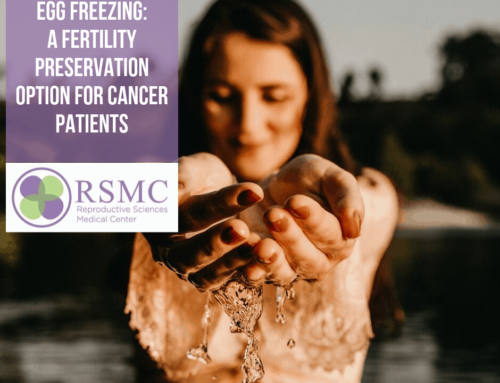It is understandable that you don’t want kids right now, but you will want them someday. You might have pondered, researched and done the preliminary math to know that freezing your eggs while you’re young keeps your options open to having children when you’re older. So, how do you decide if egg freezing is right for you or whether you are a good candidate for this process?
When you are considering egg freezing and want to learn more about the process, the first thing to do is to schedule an appointment with a fertility specialist or a reputable fertility agency like RSMC (San Diego & Irvine) to talk it over and get some preliminary tests done.
Preparing for Your First Egg Freezing Appointment
Before walking through the doors of a fertility agency for the first time, there are some steps that you should take to ensure that you are fully prepared.
Understand Your Insurance
Most insurance plans do not cover the cost of egg freezing, but it’s always worth checking to be safe. If you find that coverage is available, you would want a clinic that accepts your insurance. Since the preliminary testing is diagnostic, the insurance will cover the same. This can sum up to nice savings.
Stay in Good Health
You don’t need to be the perfect specimen to freeze your eggs. However, for a better chance of long-term success, it’s important that you are at a healthy weight and don’t smoke. You can have a basic physical examination through your ‘general physician’. A complete STI (sexually transmitted infections) screening is also good to have done before your first egg freezing appointment.
Check Your Schedule
The egg freezing process is not time-consuming, but there are a series of required appointments throughout the process. Most are time-sensitive. You’ll want to find a window of time when there are no potential scheduling conflicts such as travel or meetings. You’ll spend approximately two weeks on fertility medication during the ovarian stimulation phase of your egg donation cycle. Towards the end of this phase, the clinic will require you a few times in order to monitor via ultrasound. This will determine when you’re ready for the retrieval process. For the egg retrieval itself, you should plan to take the day off work to completely recover.
What Questions Should You Ask Your Doctor?
It’s normal to have jitters before meeting your doctor for your first appointment. You can prepare yourself with a list of questions. This is a good idea. Always remember to carry a pen and a notebook to jot down bullet points and answers. When new medical information is flying at you; it will be a challenge to keep everything straight in your head. Below is a list of questions that will help you get off to a good start.
-
Am I at The Right Age to Freeze My Eggs?
The general consensus when it comes to freezing your eggs to use later in life is “the younger, the better”. Results have consistently shown that frozen eggs from women in their twenties have a much higher IVF success rate than those from older women. Some women in their late thirties are also choosing to freeze their eggs. Even at this age, if you hope to have more than one child, egg freezing is still a good option. The decline in egg quality accelerates from this point in a woman’s reproductive life and every passing year makes a significant difference.
-
Can You be Too Young to Freeze Your Eggs?
Using the latest techniques and technology, it is now possible to safely store frozen eggs for up to a decade without a decrease in egg quality. If you feel there’s a strong possibility that you’ll be ready to become pregnant in the next 10 years, now is probably the best time to freeze your eggs. Remember that your chances of getting pregnant naturally after 45 decrease as the quantity and quality of your ovarian reserve reduce by a significant number.
-
How is My Ovarian Reserve?
Ovarian reserve is the total number of quality and viable eggs available to mature in a woman’s ovaries. Women are born with all the eggs that they will ever produce. Throughout the course of their lifetime this number gradually decreases. Most eggs disappear through the natural cycle of cell death and reabsorption, while the process of atresia loses others. During a natural cycle, about 20 follicles begin the process of maturation, but only one egg makes it to ovulation. The body then absorbs back all the remaining eggs and then loses forever. This loss of eggs accelerates as a woman ages, until the time of menopause.
At RSMC – San Diego & Irvine, before beginning the egg freezing process, you’ll undergo tests to check your ovarian reserve. The results of these tests will determine the urgency of freezing your eggs. They will also help your doctor decide what dose of fertility medication will be required. You might not be an ideal candidate to freeze your eggs if your ovarian reserve is extremely low. It is also a possibility that women with low ovarian reserve will not respond well to fertility medications and are likely to struggle to find success with IVF.
What Risks Should be Considered Before Proceeding With Freezing Your Eggs?
Our research team from San Diego & Irvine ensures that egg freezing is a very safe process. However, there can be some side effects. For most patients, side effects are extremely mild. Bloating, abdominal soreness, moodiness, sore breasts, and headaches are a few of the side effects of freezing eggs. In very rare cases, there is potential for a serious condition called Ovarian Hyperstimulation Syndrome. It is a good idea to talk to your doctor about possible complications in egg freezing. Also, you should talk with doctors about the side effects of fertility medications, and the egg retrieval procedure. It’s also important to educate yourself about the risk factors which could affect your experience.
How Many Eggs Would be Enough to Guarantee Success?
Unfortunately, there’s no magical number that can guarantee you will become pregnant when using frozen eggs. However, your doctor will be able to help you decide how many eggs to freeze, based on your age and ovarian reserve.
What if I Don’t Need All My Eggs?
It’s a good idea to have a plan if you decide not to use your eggs. Laboratories have special facilities where they carefully dispose the unused eggs. Also, there is an option to donate your extra eggs to another family who is struggling to conceive. If this interests you, then bring it up with your doctor. Your eggs need to undergo additional tests so that they can qualify for donation.
What All is Included in Freezing Eggs Cost?
Understanding the cost of egg freezing is important when you’re planning to secure your family’s future. In most agencies, price per cycle includes testing and monitoring, egg retrieval, and cryopreservation. However, there are other significant costs that are usually not included such as fertility medication, anesthesia during egg retrieval, and storing the frozen eggs. These items are usually billed separately. What is covered in the egg freezing process can vary by clinic, so make sure it is clear what the cost is upfront to avoid unwelcome surprises.
Freezing your eggs is an exciting opportunity for today’s young women. If you are considering egg freezing, Reproductive Sciences Medical Center – San Diego & Irvine has a team of expert consultants that will help you understand the process. If you have more questions you can contact us at www.fertile.com or call 858-436-7186 to schedule a consultation.























